The Devil's Only Friend Read online
Page 3
Diana growled. “Normal people don’t just turn off their human nature every time it gets inconvenient—”
“Sucks to be them, then,” I said.
“We don’t need to argue about this right now,” said Kelly. “Sometimes you have to turn off your empathy to get the job done—I learned it in the force, you learned it in the military, John learned it … I shudder to think where John learned it. Let’s just get the job done.”
A limp body in a bathtub full of blood. A broken mirror. A burning car and a twisting scream.
Twenty-one. Thirty-four. Fifty-five. Eighty-nine. One hundred forty-four.
Turn it all off and don’t feel anything.
“It’s about time,” said Potash, spotting us from his window as Kelly pulled into the apartment parking lot. There were two rows of buildings and a parking lot between them, with crumbling, open-air walkways, and stairs leading up to the apartments. It was winter, and the curbs were crusted with dirty, jagged ice. Kelly pulled to a stop behind the high, cinder block wall around the Dumpster, concealing us from anyone who might be looking out of Cody French’s window. Diana got out without a word, carrying the duffel with her disassembled rifle. “Give Diana five minutes to get in place,” said Potash, on the radio, “and meet me at the door.”
“Three minutes,” said Diana, her whisper barely audible on the shared frequency. “How incompetent do you think I am?”
“Radio silence,” said Kelly. “Go.”
We all had our jobs and we’d gone over them a dozen times at the rented office space, getting ready for this exact situation whenever the opportunity appeared. Kelly would stay in the parking lot, her badge in hand, ready to deal with any questions or nosy neighbors. Ideally we wouldn’t need her at all. Diana would be perched in the other apartment we’d rented, directly across from Cody’s, with her rifle aimed and ready to shoot anyone who chased us out his door. Ideally we wouldn’t need her either. I had a stolen key to Cody’s door, and as the one who’d planned the hit, it was my job to observe the situation and make the call to proceed or pull out. I’d go in, make sure he was as helpless as we needed, and then …
… and then I wouldn’t kill him. Potash, with a stainless-steel machete, would wait for my signal and take off Cody’s head in one clean stroke.
I could feel that machete in my hand, feel the grip and the heft and the sudden, perfect resistance as it severed the spine. This was my plan. I’d practiced it a hundred times in my head. A thousand times. Sometimes in my head I had to kill the girl, too. You never knew what complications might arise.
But I never got to do it for real.
I got out of the car and walked to the stairs, pulling the key from my back pocket. Albert Potash timed it perfectly, arriving at the door from the other direction exactly as I got there. He was an older man, lean and fit, his graying hair still trimmed to the short, military cut his kind never seemed to let go. I didn’t know exactly where he’d gotten his training, but he was some kind of ex-special forces supersoldier, the kind of man a government creates, uses, and then denies all knowledge of forever. I wasn’t surprised, when I’d looked in his file, to find it completely empty. I’d spent my short life dreaming of death, of ending one life after another, stabbing and choking and poisoning and more. He’d spent his life actually doing it. I hated him passionately.
I raised my key to the lock, but he stopped me with a sudden gesture, listening to something I couldn’t hear. After a moment he looked back at me again, rolling his hand to signal me to hurry. I unlocked the door in a rush, pushing it open as soon as the bolt scraped free of the frame, and stepped inside. Potash moved in behind me, silent as a ghost, pulling the machete from its black vinyl sheath so quickly I didn’t even see him do it—it was covered one second and gleaming faintly in the dim light the next.
The front room was dark, the windows covered with blankets, and I could hear the noise now: a muffled grunting, like someone was struggling to speak. The layout of the apartment was essentially the same as mine: a small living room with an attached kitchen, which is where we stood now; a short hallway that led to two closed doors, with a bathroom on the left and bedroom on the right. I pointed to the bedroom door, and Potash stepped forward silently. He rested his hand on the doorknob, paused a moment, then quietly pushed it open.
The room beyond wasn’t a den of horrors. No bodies hung from the ceiling, no eyes peered out from cracks in the wall. There was a simple wooden bed with a thin mattress, and Cody asleep facedown in the middle. Nearby, on the floor, bound and gagged and tied to the bedpost, was a teenage girl. I estimated her to be about fifteen years old, fully clothed, eyes haggard, but wide awake and terrified.
“Listen to me,” said Potash firmly, crouching down beside her. “I can’t untie you yet, but I need to know what’s happened here. Did this man bring you in?”
The girl squeezed her eyes shut, shaking her head violently.
Potash glanced at me. “Is she saying no or is she already crazy?”
“He gave her his supernatural awareness,” I whispered. “She could hear us outside before we even unlocked the door; it probably sounds like you’re screaming in her ear.” I lowered my voice to the barest breath. “We’re here to help you. Did this man bring you here?”
She calmed and, after a moment, she nodded.
“Did he drug you?”
She stared at me, probably trying to decide how much trouble she’d get into for answering. She apparently decided it was worth it, and nodded.
“We good to go?” asked Potash.
“She’s moved the bed almost eight inches,” I said, pointing at the depressions the bed legs had left in the carpet. “If her struggling hasn’t woken him up, nothing we do is going to.”
“This feels too easy,” he said, but I didn’t answer. If you do it right, it’s always easy. This was the great and dreadful end of everything I did, the paradox that made my life one long, successful hell. Months to find a weakness, more months to exploit it, endless nights of planning and practice, building up and building up until that one, perfectly executed strike that I don’t even get to make. Potash walked to the bed, aimed his machete, and cut off Cody’s head. The demon’s eyes snapped open, his mouth gaping in a caricature of speech, but it was too late. The bright red blood pumping from his neck turned to black, greasy ash, and his body crumbled to nothing. The girl screamed, but it wasn’t enough. It was never enough. There was no danger, no thrill, no visceral thunk as the machete vibrated in my hands.
Months of built-up tension and nothing to release it.
“It’s done,” said Potash in his radio, breaking the silence now that the job was done. He wiped his blade on the blanket and looked at the girl, passed out by his feet. “The runaway fainted, so I guess she isn’t stuck with Withered senses forever.”
“Get her out here,” said Kelly. “I’ll take her to a hospital while you and John go through the house.”
Standard procedure: we go through the house, looking for anything we can find that might give us a hint about other Withered. Finish one hunt and get started on the next one, building more anticipation. I held my hands in tight fists, pushing out the blood until my knuckles were white as bone.
No rest for the wicked.
2
Here’s a logic puzzle for you: there are four people, named Grant, Bill, Marci, and April. Each one has a different eye color: blue, brown, green, and hazel. Each one has a different role: girlfriend, neighbor, therapist, and mother. Each one died in a different way: a stabbing, a slit throat, slit wrists, and fire. One of the women died alone. The other woman died without a blade. One of the men killed the other one and then he, in turn, was killed by a child. All of them loved the child, but the child didn’t save any of them. Can you solve the puzzle and find the answer?
Do you even know what answer you’re looking for?
“Good morning, John.” Dr. Trujillo was an older man, short and squat, his white hair making a stark contrast
with his bronze skin. Him I’d probably poison, though there were other options depending on the circumstance. His shirt was wrinkled enough that I assumed he must have spent the night on the cot in the room next to Brooke’s—we’d paid Whiteflower extra to get a second room, and Trujillo slept there more often than not. He stood when I walked toward him. “I heard about the project yesterday; I’m glad it went well.”
We always called them “projects” in public. “Job” felt too crass, “mission” attracted too much attention, and “government authorized murder of a supernatural monster” just didn’t have that sassy ring to it.
“It pays the bills,” I said. He tilted his head analytically, and I rolled my eyes. “Is she awake?”
“Let me ask you a question first,” he said, as if my permission had anything to do with it. “When you say that our work ‘pays the bills,’ what do you mean? Obviously it’s true, but it’s not a way you’ve ever characterized our work before.”
“Do we have to do this right now?”
“I’m your psychologist, John, assigned to this unit specifically to help keep you and Brooke on an even keel. The reasons why you do the work you do are every bit as important as the work itself, and if you’ve begun to think—”
“Is she awake yet?”
“If you’ve begun to think of yourself less as a protector of human life and more as a contract killer, that’s exactly the kind of thing I need to be watching out for.”
Trujillo was the most zealous therapist I’d ever had, but on the plus side, having a lot of therapists meant I’d gotten really good at pissing them off. “Actually I prefer to swing as far as I can in the opposite direction,” I said. “I have a full-on messiah complex now. I don’t just protect people, I’m the outright savior of mankind.” I spread my arms beatifically.
“Now you’re just being belligerent,” said Trujillo. “That’s a deflection tactic, and we’ve talked about this before.”
“I don’t need to deflect anything,” I said, “I’m impervious to harm. Try it—you packing? I’m sure there’s a zip gun or a shiv somewhere in this place, it’s a psych ward. Of course, if you try to harm me you’ll be damned for eternity and live forever without My grace.”
Trujillo put his fingers on the bridge of his nose, sighing or pressing down on a headache. “Why do you do this, John?”
“If I tell you, it’s cheating. You’re supposed to figure it out on your own.”
“I’m here to help you.”
“I’m here to see Brooke,” I said. “Is she awake yet?”
He stared at me a moment, exasperated. I got to see his exasperated face a lot. “If not now, can we at least talk about this later?”
“Does it matter if I say no?”
“You can always say no,” he said, “but you know what will happen if you do. I can’t sign off on your psychiatric readiness to perform your job unless you open up to me.”
“In your defense,” I said, “the illusion of freedom is one of my favorite illusions. Also that one where you can pull a quarter out of someone’s ear; I love that one.”
“This does not have to be a confrontational relationship, John.”
“Then why do I have to ask you four times if my friend is awake yet?”
He blew out a rough sigh, throwing one hand in the air and then pointing it at Brooke’s door. “Yes, she’s awake.” He turned and walked back toward the side room, talking over his shoulder. “You’re not likely to get much out of her today, but you’re welcome to try. And we will talk about this later.”
“Bless you, my son.”
He grunted and disappeared into the second room. I walked to Brooke’s door and peeked in the window. She was sitting up on the bed, cross-legged, her long blond hair hanging like a tangled curtain around her shoulders. Her face was turned up, her eyes staring blankly at the ceiling, and her left hand was tracing intricate patterns in the bedspread. I opened the door—it was only locked from the inside—and she turned toward me.
“Bunâ ziua.” Her left hand, unattended, was still drawing on the blanket.
“What language is that?”
“I don’t know,” she said, “what language is this?”
“English,” I told her.
She didn’t say anything, but simply stared.
Brooke had always been thin, but a year of mental incapacitation had left her gaunt, her blue eyes sunken deep in her pale, white face. Trujillo said some of that was the drugs they had her on—they made food taste bad, so she never ate unless they forced her. Protein shakes when she was in a good mood, restraints and IV drips when she wasn’t. Her entire room had been cleared of anything dangerous, partly for our safety but mostly for hers: there were no cords, no glass, no sharp edges. Even the power outlets were nailed into the wall, because screws were too easy to extract and misuse.
“Do you remember me?” I asked.
“Of course I remember you,” said Brooke, and her eyes focused on me suddenly. “I love you.”
I sighed. “No you don’t,” I said. “You’re Brooke Watson, remember? You’re not Nobody.”
“My name is Hulla.”
We’d known the Withered as Nobody back when I was hunting it, but in her more lucid moments Brooke could remember the thing’s real name. Hulla was, according to Nathan, an old Sumerian name, but that didn’t tell us much; we already knew the Withered were ancient. Did Hulla come from Sumer, or just borrow a name when she got there?
“Do you love me back, Ghita?”
“I’m John,” I said. “You’re Brooke and I’m John.”
Her hand was still drawing, all by itself, like it wasn’t even a part of her at all.
“I saw Meshara last night.”
“These are not real people,” I said. “Not anymore. You live in Whiteflower Assisted Living Center in a town called Fort Bruce. My name is John Wayne Cleaver. Do you remember any of this?” I couldn’t tell how much of her was Brooke and how much was Hulla; how much was crazy and how much was drugs designed to control the crazy. I could only imagine how much worse it was for her.
“Of course I remember you,” she said again. “You lived on my street. We were friends. I married you and I died the next day.”
“I’m not Ghita,” I said, “I don’t even know who that is. My name is John, and this is—”
“This is the Whiteflower Assisted Living Center,” said Brooke. “My name is Nobody and I was born ten thousand years ago in a shepherd’s hut on the slopes of the great mountain. And Meshara was there and now he’s here.”
I sat up straighter; this was different than her usual ranting. She called me by old names occasionally, thinking I was someone from her past, but she’d never referred to anyone else that way except for the actual Withered: the two we’d known in Clayton were named Mkhai and Kanta, just like Nobody was named Hulla. These were their old names, the names they used for each other; to hear her use such a name for someone she’d seen last night, and to connect it with something so deep in the past, was troubling, to say the least. Who was this Meshara? “You saw somebody here?” I asked. “You recognized him?”
“In the lobby downstairs,” she said. “The doctor took me for a walk. I almost didn’t recognize him, it’s been so long. Maybe a hundred years.”
We thought there were only two Withered in Fort Bruce. If there were three … “Did you tell Trujillo who you saw?”
“I don’t like Dr. Trujillo.” Brooke scowled. “He never lets me cut my own food.”
“Can you describe Meshara to me?”
“He’s sad.”
“What does he look like?”
“He looks sad.”
I stood up and walked to the door; I needed to talk to Trujillo. “Could you point him out to me if you saw him again?”
Her voice changed suddenly, losing the odd, disconnected tone she always seemed to use when she was remembering things and becoming suddenly sharp and pained. “Please don’t leave me.”
“I’m comi
ng back, I just need to—”
“No one ever comes back.”
“I promise,” I said, and knocked on the door. “Just try to remember everything you can about Meshara, okay? Can you do that?”
“He’s here,” said Brooke.
“I know, and I need you to remember everything you can about him—”
“Not Meshara,” said Brooke. “The doctor.”
Half a second later Trujillo stepped into view through the window and did a visual check of the room before opening the door. “Is everything okay?”
I shot one last look at Brooke; she had tears on her cheeks and look of abject despair in her pale, haunted eyes. I turned away, stepped into the hall, and closed the door firmly behind me.
“Did you take her on a walk last night?”
“Yes, down to the lobby and back. We bought some candy from the vending machine.”
“She’s found another Withered, here in Whiteflower.”
His brow furrowed in worry. “There were only supposed to be two in the city.”
“Exactly,” I said. “And if there’s an extra one, and if he’s here, right under our noses, it only means one thing: the Withered are hunting us now.”
* * *
“Ghita is a Romanian name,” said Nathan. “Her greeting was also Romanian: ‘bunâ ziua’ means ‘good morning.’ That’s all in line with the kind of flashbacks we tend to see from Brooke: she woke up with the wrong memories on the surface of her consciousness, and so she thought she was a Romanian villager. Not exactly the worst-case scenario for her, all things considered.”
“And Meshara?” asked Agent Ostler. The entire team was gathered around a table in our office, a rented space across the street from Whiteflower. I could tell by the way they were fidgeting—drumming their fingers on the table, glancing at the windows, shifting their weight from foot to foot without bothering to sit down—that they were just as tense as I was.
“That one’s not Romanian,” said Nathan. “I haven’t had time to look into it too deeply, but my preliminary research suggests that Meshara is Sumerian, like Hulla, which suggests in turn that this is another Withered. Kudos to John for spotting it.”

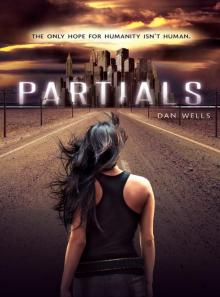 Partials
Partials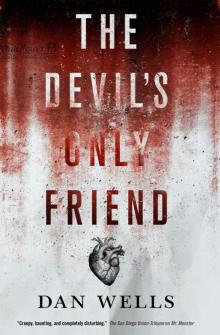 The Devil's Only Friend
The Devil's Only Friend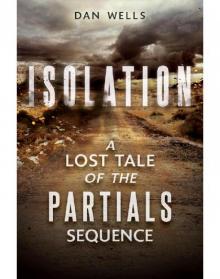 Isolation
Isolation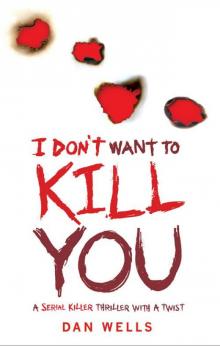 I Don't Want to Kill You
I Don't Want to Kill You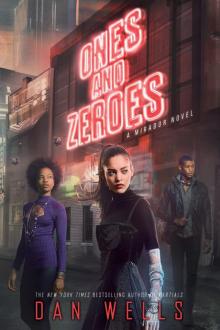 Ones and Zeroes
Ones and Zeroes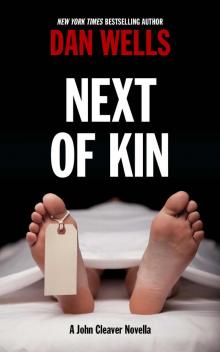 Next of Kin
Next of Kin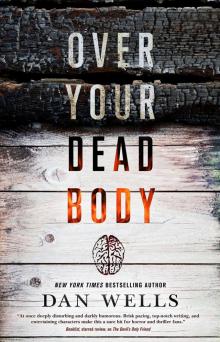 Over Your Dead Body
Over Your Dead Body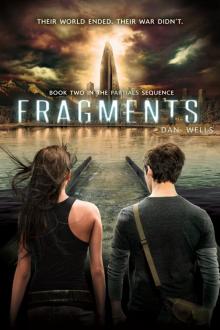 Fragments
Fragments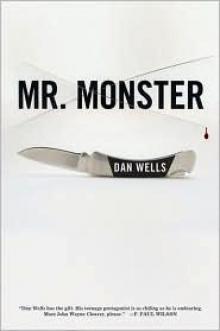 Mr. Monster
Mr. Monster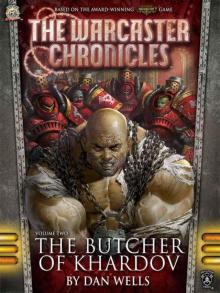 The Butcher of Khardov
The Butcher of Khardov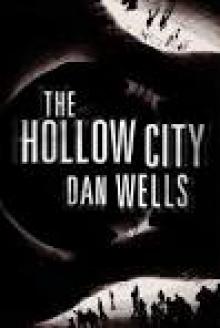 I AM NO T A S E RI AL KI L L E R
I AM NO T A S E RI AL KI L L E R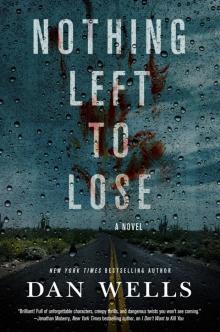 Nothing Left to Lose--A Novel
Nothing Left to Lose--A Novel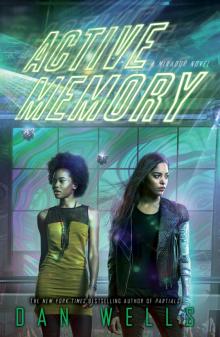 Active Memory
Active Memory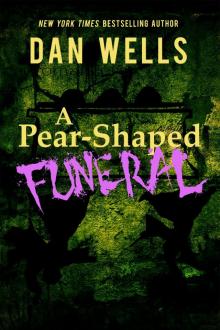 A Pear-Shaped Funeral
A Pear-Shaped Funeral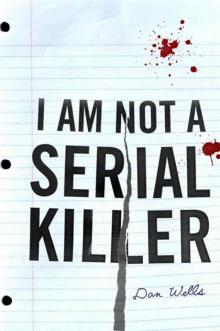 I Am Not a Serial Killer
I Am Not a Serial Killer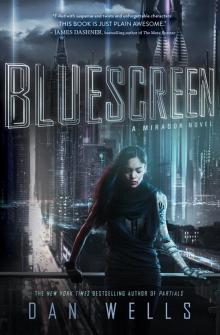 Bluescreen
Bluescreen Ruins
Ruins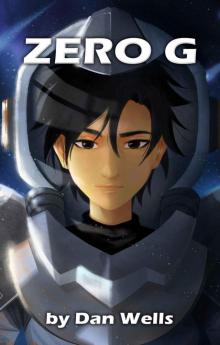 Zero G
Zero G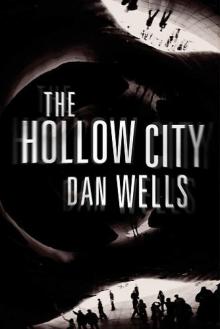 The Hollow City
The Hollow City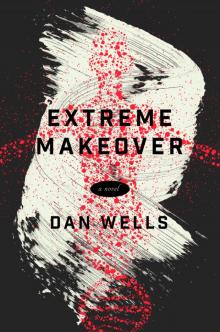 Extreme Makeover
Extreme Makeover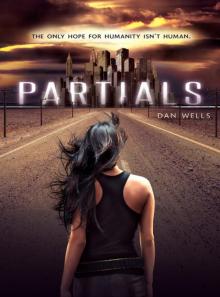 Partials p-1
Partials p-1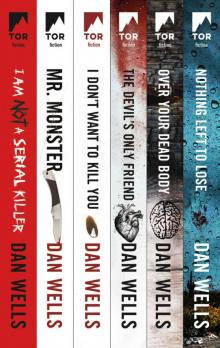 The Complete John Wayne Cleaver Series: I Am Not a Serial Killer, Mr. Monster, I Don't Want to Kill You, Devil's Only Friend, Over Your Dead Body, Nothing Left to Lose
The Complete John Wayne Cleaver Series: I Am Not a Serial Killer, Mr. Monster, I Don't Want to Kill You, Devil's Only Friend, Over Your Dead Body, Nothing Left to Lose